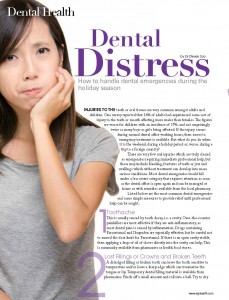 This article first appeared in the December 2013 issue of Ezyhealth magazine. We have reproduced it for the information of those of you who missed it when it was published.
This article first appeared in the December 2013 issue of Ezyhealth magazine. We have reproduced it for the information of those of you who missed it when it was published.
Injuries to the teeth or oral tissues are very common amongst adults and children. One survey reported that 16% of adults had experienced some sort of injury to the teeth or mouth affecting more males than females. The figures are worse for children with an incidence of 35% and not surprisingly twice as many boys as girls being affected. If the injury occurs during normal dental office working hours, then access to emergency treatment is available, but what do you do when it is the weekend, during a holiday period or worse during a trip to a foreign country?
There are very few oral injuries which are truly classed as emergencies requiring immediate professional help, but these may include bleeding, fractures of teeth or jaw and swellings which without treatment can develop into more serious conditions.
Most dental emergencies would fall under a less severe category that requires attention as soon as the dental office is open again and can be managed at home or with remedies available from the local pharmacy.
Listed below are the most common dental emergencies and some simple measures to provide relief until professional help can be sought.
1. Toothache.
This is usually caused by tooth decay i.e. a cavity. Over the counter painkillers are most effective if they are anti-inflammatory as most dental pain is caused by inflammation. Drugs containing Paracetamol and Ibuprofen are especially effective, but be careful not to exceed the dose limit for Paracetamol. If there is an open cavity visible, then a applying a drop of oil of cloves directly into the cavity can help. This is commonly available from pharmacies or health food stores.
2. Lost fillings or crowns and broken teeth.
A dislodged filling or broken tooth, can leave the tooth sensitive to temperature and/or leave a sharp edge which can traumatise the tongue or lip.
Temporary dental filling material is available from pharmacies. Pinch off a small amount and roll into a ball. Try to dry the cavity with a tissue rolled into a point and then push the cement into the cavity and smooth off with your finger.
This can also be used to recement crowns that have come off. Again dry the crown and tooth with a tissue, place a small amount of material into the crown and push firmly back into place. Allow to set for 30 mins and avoid heavy biting until you see the dentist.
3. Trauma to the teeth.
This can result in simply a loose tooth which may or may not be in a different position or even an avulsion (tooth completely out). If the tooth is displaced forwards, backwards or sideways, try to reposition it immediately with your finger back to its original position, don’t bite on it and see your dentist as soon as possible.
If the whole tooth has been knocked out, then handle the tooth only by the crown and don’t touch the root. Rinse with cold milk is best or water if no milk ison hand. Do not scrape off any soft tissue on the root or try to scrub it. Replace gently into the socket or you may have to push firmly if there is a blood clot. Biting on a folded cloth can help to reposition it as this will apply some pressure. Do not eat on it and choose a soft diet then arrange to see your dentist as soon as possible.
Displaced deciduous (baby) teeth should be gently repositioned if it interferes with the bite. If not they can be left and may spontaneously reposition themselves. Baby teeth that are completely knocked out should not be replaced to avoid the risk of further trauma to the underlying adult tooth.
4. Trauma to the soft tissues i.e. lips and tongue.
This can occur due to external trauma or simply accidental biting. There might seem to be a lot of blood as the bleeding mixes with saliva to give the appearance of more blood than there is. Fortunately oral lesions don’t often get infected as saliva provides excellent protection. Warm salt mouth rinses can help keep the wound clean. Anti-septic mouthwashes with Chlorhexidine are very good. Bleeding can be stopped with a damp gauze/handkerchief and pressure. A dry gauze will stick to the wound and it will bleed again when removed.
5. Ulcers.
These can be very painful and relief can be provided using mouthwash or lozenges containing Benzydamine to help numb the pain. Pharmacies carry a range of medicaments for treatment of oral ulcers.
6. Swelling.
This is most likely due to a dental infection and upon confirmation of the diagnosis will need a course of anti-biotics. If no professional help is available then application of an ice-pack, for example, a plastic bag filled with ice or a bag of frozen peas will do and should help prevent the swelling getting larger. This can develop into a serious condition should the infection spread so a visit to the dentist as soon as possible is recommended.
7. Broken dentures.
Collect any fragments and try to fit them together. Some people will try and self-repair with superglue which is generally not advised, due to the toxic nature of the glue . If any pieces are missing and you are suspicious they have been swallowed or worse inhaled then this may or may not give rise to breathing difficulties. Your dentist may refer you for investigation if this is suspected.
8. Wisdom teeth.
When these erupt, the gum can be tender and inflamed or if impacted they can get infected. Maintaining good oral hygiene with the aid of an anti-septic mouthwash will help. Painkillers as above will also help, but if infected a course of anti-biotics is indicated. Ultimately they may require removal.
The remedies mentioned above are really only temporary fixes providing symptomatic relief until professional help is available. They can give you some measure of comfort when the emergency arises as is usually the case, at the most inconvenient time. Pharmacies are a great source of home use dental products and can also give additional advice. It is best to have your dentist’s number on hand, in case of such dental emergencies.
 Dr. Steven Soo is a Dental Specialist in Prosthodontics at Specialist Dental Group®. He was formerly a Clinical Lecturer at the Eastman Dental Institute and Clinical Teacher at the GKT Dental Institute, both of which are affiliated with the University of London. Dr Soo has a special interest in prosthetic and implant restorative dentistry. For more information, visit www.specialistdentalgroup.com
Dr. Steven Soo is a Dental Specialist in Prosthodontics at Specialist Dental Group®. He was formerly a Clinical Lecturer at the Eastman Dental Institute and Clinical Teacher at the GKT Dental Institute, both of which are affiliated with the University of London. Dr Soo has a special interest in prosthetic and implant restorative dentistry. For more information, visit www.specialistdentalgroup.com





